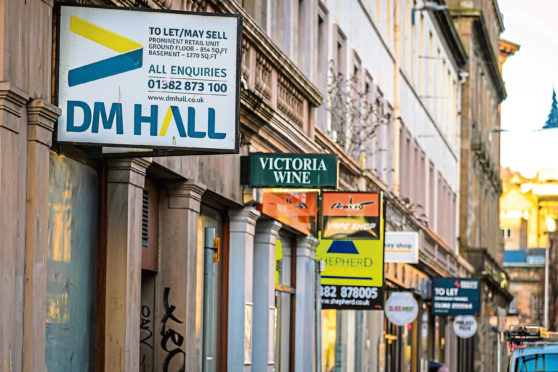Morrissey, before he went completely off-piste, once said that every day in a provincial town is like a Sunday.
Take a walk through Dundee city centre, or Kirkcaldy or Arbroath, and you will understand that of which the former Smiths front man once sang.
Because while high streets used to be full of hustle and bustle, today they are mostly desolate, forlorn places where only a few stragglers shuffle between 99p stores and former high street behemoths like HMV, which stagger from administration to administration like the undead of the retail world.
What business there is in high streets now tends to centre on the same few chain restaurants and stores while independent traders face a seemingly impossible task to survive.
The opening of V&A Dundee has brought many benefits to Dundee and its economic impact has been largely positive, but its shops, cafes, restaurants and other businesses in the city centre have not really felt any benefit.
Businesses like Castlehill Restaurant and Fatburger have both gone under in recent weeks while shops like Bonmarche and Edinburgh Woollen Mill are closing down.
It does not take a genius to figure out why so many city and town centre businesses are collapsing.
Online retailers have gutted high streets while years of austerity has meant fewer people have money to spend on luxuries such as shopping or eating out.
Although both Castlehill and Fatburger catered for vastly different markets, it’s clear not enough customers thought what they were selling was worth the price.
But it’s not all about business strategies. Businesses that rely on passing trade require trade to be passing.
As our shopping habits have changed from browsing shelves in person to clicking from recommendation to recommendation online, so too have our travel habits.
More people now have cars than they did even 20 years ago so, for many, out-of-town retail parks are a more attractive option than a weekly visit to their local high street.
Businesses also face annual rates bills that would make your eyes water, with many staring at a six-figure bill before they have rung a single sale through their till.
It’s no wonder so many go to the wall.
It means that local authorities have to manage town centres extremely carefully.
In Angus, the introduction of off-street parking charges was supposed to net the council around £700,000 a year. In its first year of operation it contributed less than half that sum to council coffers.
While Angus Council was keen to trumpet this as extra income it would not have otherwise received, the actual cost to businesses themselves is harder to calculate.
Dundee is, at least, doing something to attract shoppers, offering discounted rates at its council-run car parks on weekends, although plans for a low-emission zone may deter some drivers from making the trip in, even if those car parks will still be accessible to them.
Of course, the simple solution would be for all of us to recognise that we use our local high street or we lose it.
But as more businesses fold and the choice of outlets diminishes, then the spiral of decline will continue.
And that is bad for everyone.
Coming soon to a TV near you
So, sort-of-farewell, then, Harry and Meghan.
The Duke and Duchess of Sussex are to step down from their “senior” position with the royal family and will work to become financially independent, which, given their own personal fortunes, they already surely are.
There has been genuine outrage in some quarters over the couple’s decision, although I suspect executives in the offices of Netflix are rubbing their hands with no little glee.
After a few years of tootling happily along, recent weeks have been uncomfortable for the House of Windsor. Prince Andrew’s interview from hell with Emily Maitlis and now a split in the royal family itself will surely guarantee bumper ratings for future series of The Crown.
Feeling gravity’s pull
Seven Extinction Rebellion activists found themselves in court this week, after three people scaled an oil rig in the Port of Dundee.
The environmental pressure group wants to highlight the dangers of our continued reliance on fossil fuels.
Most people are sympathetic to the need to address climate change.
It is, after all, our world and we all need to live here.
But there is a certain irony in the campaigners who came prepared for an “extended occupation” of the rig only to be forced down a few, short hours later after Mother Nature blew a bit of a hoolie down the Tay.
Nature, it seems, has no favourites.










